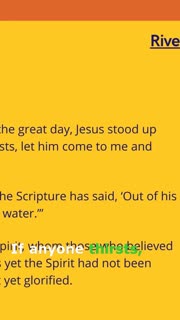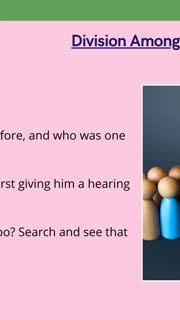Jesus: The Living Water for Every Thirsty Soul
Devotional
Sermon Summary
Bible Study Guide
Sermon Clips
### Quotes for Outreach
1. "If anyone thirsts, let him come to Me and drink. Whoever believes in Me, as the Scriptures have said, out of his heart will flow rivers of living water. Now this He said about the Spirit, whom those who believed in Him were to receive. For as yet the Spirit had not been given, because Jesus was not yet glorified." (24 seconds)
2. "Jesus' invitation is for everyone, regardless of race, regardless of class, regardless of intelligence, whether you're rich or poor, it doesn't matter which nationality you're from or where you lived. This is the great news for anyone, no matter your past. Jesus' invitation is for everyone." (22 seconds)
3. "If anyone thirsts and comes to Jesus, you will be saved. You will then receive the Holy Spirit, our Counselor, our Encourager. And Jesus describes the result of salvation in verse 38. He says, whoever believes in me, as the Scriptures have said, out of his heart, will flow rivers of living water." (-965 seconds)
4. "Rivers of living water means that when you are saved, when you believe in Jesus, when you come to Him, the Spirit of God comes upon you, the Holy Spirit. And what happens when the Holy Spirit comes upon you? It makes us joyous and it makes us thankful. Rivers of living water flows out of your life when you believe in Jesus." (23 seconds)
5. "If anyone thirsts, come to Jesus and drink. Whoever believes in Jesus, as the scriptures have said, out of his heart will flow rivers of living water." (-1299 seconds)
### Quotes for Members
1. "In verse 37 to 39, Jesus made a bold claim. It was so bold that it caused division among the people, not only those who heard him, but also the Jewish leaders who attempted to capture and arrest Jesus. And so there are four types of people mentioned. This passage and it can be categorized based on their reactions to Jesus and his teaching. And they are, and we've got them on the screen here, the confused." (34 seconds)
2. "Jesus used this festival of shelters and the ceremonies and the traditions around Him to point them towards Himself being the fulfillment of all the prophecies, of all the ceremonies, of all the festivals. And I could go on, and I probably will if you allow me to, but I'll actually conclude this text next week." (24 seconds)
3. "When you hear these claims, where do your thoughts go? Are you one of the four types of people? Are you confused, uncertain, or unclear about who Jesus is? And perhaps you come here week on week, you hear the teachings, or you get onto YouTube, on the internet, you read the forums, watch the videos, and you hear conflicting opinions. And perhaps for you, there is a lack of clarity." (38 seconds)
4. "Maybe you're actually part of the contentious group, hostile and actively opposed to Jesus. Maybe what Jesus has said, or dare I say what you've seen and heard in people professing to be Christ's followers, as a threat to your own authority, perhaps to your own traditions. Maybe it's touched a raw nerve. Or maybe you know someone like this who's perhaps hostile to God." (-1299 seconds)
5. "And during Jesus' time, there was a tradition of pouring out water during the festival. In the temple, a priest would pour a specific amount of water on the altar during the morning sacrifice, alongside the various other offerings. Now, this particular ceremony was not mentioned in the Torah as part of the original celebration, but actually, I think the way they've done it was actually derived from interpretations of certain passages." (36 seconds)
Ask a question about this sermon
1. "If anyone thirsts, let him come to Me and drink. Whoever believes in Me, as the Scriptures have said, out of his heart will flow rivers of living water. Now this He said about the Spirit, whom those who believed in Him were to receive. For as yet the Spirit had not been given, because Jesus was not yet glorified." (24 seconds)
2. "Jesus' invitation is for everyone, regardless of race, regardless of class, regardless of intelligence, whether you're rich or poor, it doesn't matter which nationality you're from or where you lived. This is the great news for anyone, no matter your past. Jesus' invitation is for everyone." (22 seconds)
3. "If anyone thirsts and comes to Jesus, you will be saved. You will then receive the Holy Spirit, our Counselor, our Encourager. And Jesus describes the result of salvation in verse 38. He says, whoever believes in me, as the Scriptures have said, out of his heart, will flow rivers of living water." (-965 seconds)
4. "Rivers of living water means that when you are saved, when you believe in Jesus, when you come to Him, the Spirit of God comes upon you, the Holy Spirit. And what happens when the Holy Spirit comes upon you? It makes us joyous and it makes us thankful. Rivers of living water flows out of your life when you believe in Jesus." (23 seconds)
5. "If anyone thirsts, come to Jesus and drink. Whoever believes in Jesus, as the scriptures have said, out of his heart will flow rivers of living water." (-1299 seconds)
### Quotes for Members
1. "In verse 37 to 39, Jesus made a bold claim. It was so bold that it caused division among the people, not only those who heard him, but also the Jewish leaders who attempted to capture and arrest Jesus. And so there are four types of people mentioned. This passage and it can be categorized based on their reactions to Jesus and his teaching. And they are, and we've got them on the screen here, the confused." (34 seconds)
2. "Jesus used this festival of shelters and the ceremonies and the traditions around Him to point them towards Himself being the fulfillment of all the prophecies, of all the ceremonies, of all the festivals. And I could go on, and I probably will if you allow me to, but I'll actually conclude this text next week." (24 seconds)
3. "When you hear these claims, where do your thoughts go? Are you one of the four types of people? Are you confused, uncertain, or unclear about who Jesus is? And perhaps you come here week on week, you hear the teachings, or you get onto YouTube, on the internet, you read the forums, watch the videos, and you hear conflicting opinions. And perhaps for you, there is a lack of clarity." (38 seconds)
4. "Maybe you're actually part of the contentious group, hostile and actively opposed to Jesus. Maybe what Jesus has said, or dare I say what you've seen and heard in people professing to be Christ's followers, as a threat to your own authority, perhaps to your own traditions. Maybe it's touched a raw nerve. Or maybe you know someone like this who's perhaps hostile to God." (-1299 seconds)
5. "And during Jesus' time, there was a tradition of pouring out water during the festival. In the temple, a priest would pour a specific amount of water on the altar during the morning sacrifice, alongside the various other offerings. Now, this particular ceremony was not mentioned in the Torah as part of the original celebration, but actually, I think the way they've done it was actually derived from interpretations of certain passages." (36 seconds)










